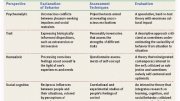
Personality psychologists examine individual traits and behavior and determine how they influence the outcome of specific individual and group situations. The career requires a substantial education culminating in a doctorate and a great deal of research experience.
| Required Education | Doctoral degree |
| Other Requirements | State licensing |
| Projected Growth (2012-2022)* | 12% (for all psychologists) |
| Average Salary (2014)* | $89, 810 (for all other psychologists not listed separately) |
Source: *U.S. Bureau of Labor Statistics
Job Description
Personality psychologists observe social situations and how they are influenced by individual emotion and conduct. They explain behavior in areas such as aggression, persuasion, attraction, conformity and group interaction. Many specialize in a niche such as leadership, attitude, group behavior and conflict resolution.
Job Setting
Personality psychologists work within many industries in research and analysis, consultation and applied concepts. Many teach and conduct research within a university setting. Others may train government officials, develop programs to improve attitudes within the workplace or analyze customer trends in business. Psychologists also maintain consultation practices within hospitals or other healthcare settings.
Job Outlook and Salary Info
Employment of psychologists in general was predicted to increase 12% between 2012 and 2022, which was about as fast as average compared to all occupations, according to the U.S. Bureau of Labor Statistics. Clinical, counseling and school psychologists earned an average annual wage of $74, 030 in May 2014. At the same time, industrial-organizational psychologists earned and annual average salary of $90, 070 and all other psychologists, including those working as researchers and those working at colleges and universities, earned an average wage of $89, 810 per year.
Education Information
Those who master the science of psychology commit to continued education and the application of learned principles. Students interested in individual characteristics that motivate behaviors can pursue an extensive education in the niche of personality psychology and expect to perform extensive analysis and testing during their careers.
Bachelor's Degree
The education track for a personality psychologist begins by earning high grades throughout an undergraduate program, preferably in psychology. A clinical or research-oriented internship can provide valuable practical experience. Students should prepare themselves to take the Graduate Record Examination (GRE), a mandatory test for admission into graduate programs in all areas of psychology.
Master's Degree
Admission into graduate psychology programs is competitive. The master's and doctoral degree programs are often combined, with the master's degree being part of the process to obtain the doctorate. Students take courses focused on specific aspects of personality and social norms. Completion of a master's thesis in a specific area of personality psychology is an integral part of the master's program.
Source: study.com

|
Property of UNT XXL University of North Texas T Shirt S Sport Grey Apparel ()
|
You might also like:


|
University of North Texas Garden Flag and Yard Banner Sports (College Flags and Banners Co.)
|

|
NCAA North Texas Mean Green Women's 13-Inch Gameday Boots, Brass, 8 B (M) US Sports (Gameday Boots)
|

|
Fishing Texas: An Angler’s Guide (Angler's Guides) Book (Shearer Publishing)
|

|
North Texas Mean Green Eagles University Large College Flag Sports (College Flags and Banners Co.)
|














